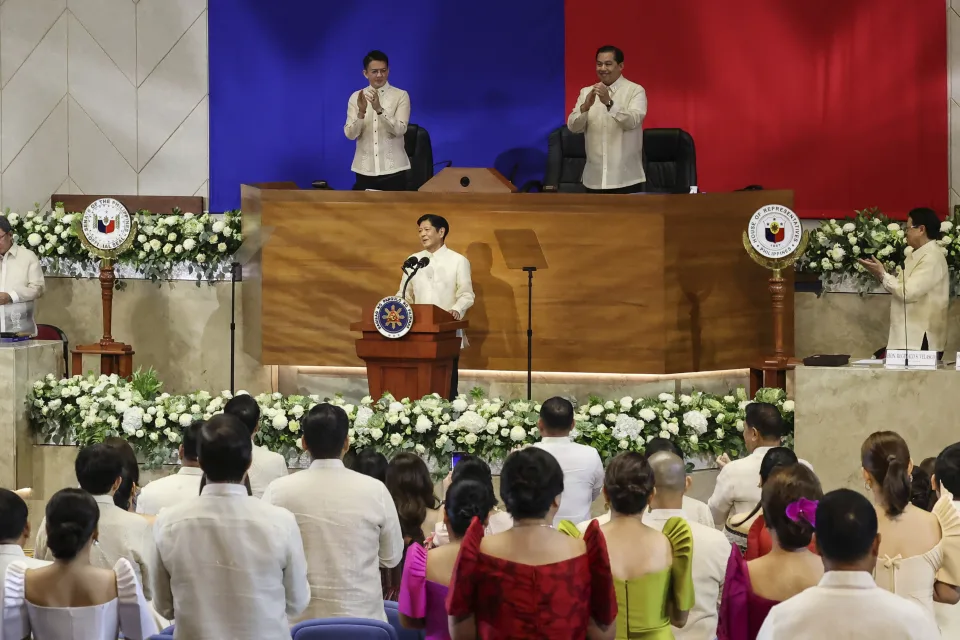MANILA, Philippines (AP) — Philippine President Ferdinand Marcos Jr. on Monday ordered an immediate ban on widespread and mostly Chinese-run online gaming operations, accusing them of venturing into crimes, including financial scams, human trafficking, torture, kidnappings and murder.
His move to ban the Chinese-run online gambling outfits — estimated to number more than 400 across the Philippines and employing tens of thousands of Chinese and Southeast Asian nationals— came amid a crackdown backed by Beijing.
That has led to the shutdown of several sprawling complexes where authorities suspect thousands of Chinese, Vietnamese and other nationals mostly from Southeast Asia have been illegally recruited and forced to work in dismal conditions.
Marcos announced the decision during his state-of-the-nation address, when he also said that the Philippines would press efforts to strengthen its defensive capability by forging security alliances with friendly countries to counter threats to its territorial interests in the South China Sea, adding that his country would only settle disputes through diplomacy.
The Philippines has a complicated relationship with China, including significant trade engagements and cooperation against crime. But they have also had longstanding disputes in the South China Sea.
Relatedly, Philippine senators ordered the arrest of a town mayor in Tarlac province north of Manila who has failed to appear at public hearings where allegations against her were being investigated, including her alleged links to a large online gambling complex near her townhall and suspicions that she fraudulently hid her Chinese nationality to be able to run for a public office reserved only for Filipinos.
The mayor, Alice Guo, has denied any wrongdoing but has been suspended from her post with her financial assets ordered frozen. Philippine senators say the massive online gambling industry has flourished largely due to corruption in regulatory agencies and payoffs to local officials.
“Disguising as legitimate entities, their operations have ventured into illicit areas furthest from gaming such as financial scamming, money laundering, prostitution, human trafficking, kidnapping, brutal torture, even murder,” Marcos said in his address. “The grave abuse and disrespect to our system of laws must stop.”
Marcos ordered the gaming agency to wind down the operations of the gambling outfits by year’s end, drawing loud applause in the House of Representatives. He asked labor officials to look for alternative jobs for Filipino workers who would be displaced because of the shutdown.
Setting out his vision for the year ahead, Marcos outlined moves to address a range of issues, including soaring costs of food and electricity, poverty and low wages.
His administration’s “bloodless war” on dangerous drugs never aimed at “extermination,” Marcos said in an obvious criticism of his predecessor’s brutal anti-drugs crackdown that left thousands of mostly innocent suspects killed.
The International Criminal Court has been investigating the widespread drug killings under former President Rodrigo Duterte as a possible crime against humanity. Duterte has denied authorizing extrajudicial killings.
On Manila’s increasingly hostile disputes with Beijing, Marcos stressed the Philippines would not back down but would only resort to peaceful means to resolve any dispute.
“The West Philippine Sea is not only a figment of our imagination. It belongs to us,” Marcos said, using the Philippine name for the stretch of the South China Sea that Manila claims.
“In the face of challenges to our territorial sovereignty, we will assert our rights and interests in the same fair and pacific way that we have always done,” Marcos said. “Proper diplomatic channels and mechanisms under the rules-based international order remain the only acceptable means of settling disputes.”
Recent confrontations at the Second Thomas Shoal and outlying waters have sparked fears of a larger conflict that could involve the United States, the longtime treaty ally of the Philippines.
In the worst confrontation, Chinese forces on motorboats repeatedly rammed and then boarded two Philippine navy boats on June 17 to prevent Filipino personnel from transferring food and other supplies including firearms to the ship outpost in the shallows of the shoal, according to the Philippine government.
The Chinese seized the Philippine navy boats and damaged them with machetes and improvised spears. The violent faceoff wounded several Filipino navy personnel in a chaotic skirmish.
On Sunday, the Philippine government said it had reached a deal with China in the hope of ending confrontations at the Second Thomas Shoal. Neither side released the text of the agreement.
